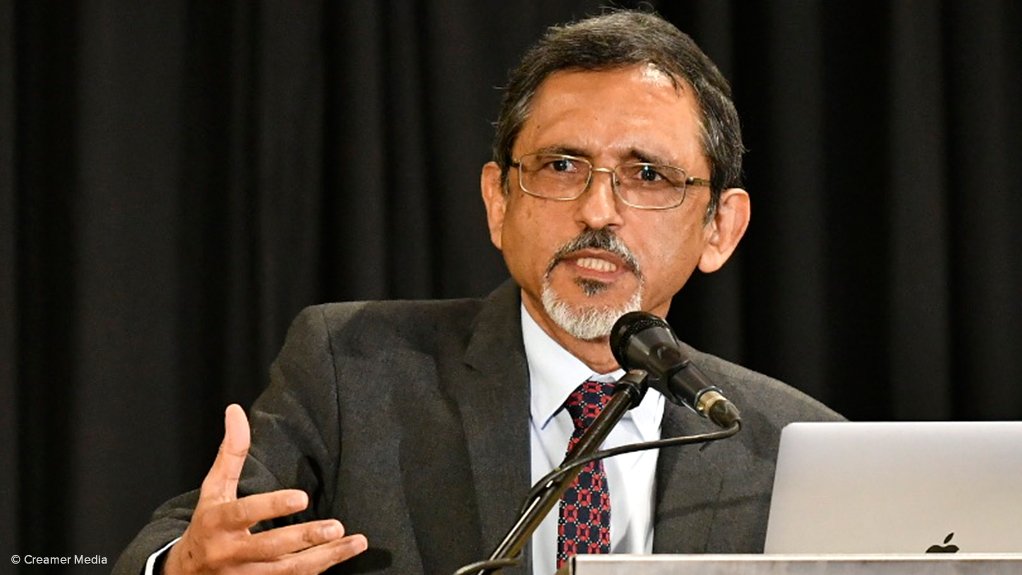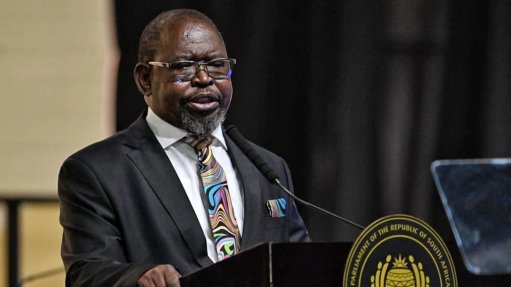Patel believes industrial policy needs continued investment to yield full potential


Trade, Industry and Competition Minister Ebrahim Patel
Photo by Creamer Media's Donna Slater
Trade, Industry and Competition Minister Ebrahim Patel has called for rapid scaling up of infrastructure spending, among other urgent initiatives, to ensure current industrial policy can succeed.
He was speaking at the launch of the Department of Trade, Industry and Competition’s (dtic’s) newly launched Industrial Policy and Strategy Review at the newly established Tshwane Automotive Special Economic Zone (TASEZ), on May 7.
The review maps the measures and actions of government over the past five years under the Reimagined Industrial Strategy laid out by President Cyril Ramaphosa and reflects on the evolution of policy actions since the African National Congress (ANC) came to power in 1994.
“There is a need to increase levels of investment to at least R400-billion to R500-billion a year in fixing public infrastructure, drawing on private and public sector resources, with a combination of delivery mechanisms, including build-operate-transfer, public-private partnerships and public sector financing models,” Patel explained.
Patel also noted that investment facilitation policies would need to target new investment pledges of R2-trillion within the next five years, with at least R1.5-trillion of those funds being spent and at least 70% of all projects being under construction or completed or with machinery being installed during that period.
“InvestSA should be strengthened with consideration of additional unblocking powers, set out in proposed legislation to address red tape and investment blockages,” he stated.
He said labour-intensive industries needed to be prioritised, particularly in the professional services sector, the basic consumer goods sector and the plastics, clothing and furniture production sectors.
He added that further development and scaling up of South Africa’s green industrialisation was also needed, which included the production of electric vehicles and components, green hydrogen and critical minerals processing needed in the battery value chain.
Patel said the past five years saw opportunities arise to deliver more effective and focused industrial policies. However, he admitted that these opportunities were undermined by an unprecedented series of economic shocks. Chief among these was the Covid-19 pandemic, along with civil unrest and flooding.
Aside from the pandemic, ongoing loadshedding, the lingering consequences of State capture and poor service delivery continued to create persistent headwinds that undermined industrial development.
“The resulting headwinds meant that the new approach could not secure the full benefit of faster growth. Still, it laid the basis for a more successful industrial policy in the future,” Patel said.
He said the opportunities for improved industrial policies were derived from fundamental changes to the way sector plans were developed and implemented, as well as new approaches to investment and export promotion.
Key among these opportunities was the development of the African Continental Free Trade Area agreement and the accompanying significant evolution in the way that competition and tariff policies were handled.
“In the past five years, South Africa has seen growing demand for more rapid change to generate a more inclusive economy. The result has been rising expectations that industrial policy will do more to promote opportunities for the majority of our people,” Patel said.
However, he said this was hampered by persistent inequality and rampant unemployment that stemmed from high levels of economic concentration, which he believed had marginalised small-scale black businesses.
He said further investment would be poured into supporting the development of black industrialists.
Patel further explained that there was a dire need for government to resolve the key structural constraints to faster economic growth, which boiled down to ensuring greater energy security, improved logistical capabilities, reduced market concentration and reducing the overall cost of doing business.
“A central constraint to sustained economic growth is South Africa’s stubbornly low investment-to-GDP rate,” he noted.
Overcoming this would require government reforming the basket of incentives provided to the private sector to increase its impact. This could include streamlining incentive applications processes across government to reduce administrative costs, policy changes that shift the onus to the applicant to prove that without the incentive the investment would not take place, and a thorough review of the scope and range of incentives across all spheres of government to reduce duplication and test for effectiveness.
He added that an analysis of the effective tax rate for different sectors would also be necessary to rebalance the fiscus and allow for greater support to industries that can drive job creation.
Patel said carefully crafted tax incentives, alongside direct investment, going forward could play a key role in helping the country bolster the trajectory of technological development, and that government would need to play a more proactive role in driving such progress.
He also noted that the industrial policy could be strengthened in future through further investment into secondary cities.
“Building on prior spatial industrial programmes like the special economic zones and the District Development Model, it is recommended that five secondary cities be targeted for pilot industrial policy partnerships,” Patel said.
He explained that these partnerships would seek to mutually develop a regional industrial plan around select secondary cities and create shared capacity between the municipality and central government for common industrial policy tasks like export promotion, investment promotion and company-level financing and support.
“Excessive consolidation of economic activity around the metropoles could prevent opportunities reaching people in need. Weakening municipal finances and capacity leaves secondary economic areas little space to arrest this threatened centralisation and a lack of central support could mean economic activity continues to gravitate to the cities and regions with the clout to implement their own regional industrial policies,” Patel stated.
Article Enquiry
Email Article
Save Article
Feedback
To advertise email advertising@creamermedia.co.za or click here
Press Office
Announcements
What's On
Subscribe to improve your user experience...
Option 1 (equivalent of R125 a month):
Receive a weekly copy of Creamer Media's Engineering News & Mining Weekly magazine
(print copy for those in South Africa and e-magazine for those outside of South Africa)
Receive daily email newsletters
Access to full search results
Access archive of magazine back copies
Access to Projects in Progress
Access to ONE Research Report of your choice in PDF format
Option 2 (equivalent of R375 a month):
All benefits from Option 1
PLUS
Access to Creamer Media's Research Channel Africa for ALL Research Reports, in PDF format, on various industrial and mining sectors
including Electricity; Water; Energy Transition; Hydrogen; Roads, Rail and Ports; Coal; Gold; Platinum; Battery Metals; etc.
Already a subscriber?
Forgotten your password?
Receive weekly copy of Creamer Media's Engineering News & Mining Weekly magazine (print copy for those in South Africa and e-magazine for those outside of South Africa)
➕
Recieve daily email newsletters
➕
Access to full search results
➕
Access archive of magazine back copies
➕
Access to Projects in Progress
➕
Access to ONE Research Report of your choice in PDF format
RESEARCH CHANNEL AFRICA
R4500 (equivalent of R375 a month)
SUBSCRIBEAll benefits from Option 1
➕
Access to Creamer Media's Research Channel Africa for ALL Research Reports on various industrial and mining sectors, in PDF format, including on:
Electricity
➕
Water
➕
Energy Transition
➕
Hydrogen
➕
Roads, Rail and Ports
➕
Coal
➕
Gold
➕
Platinum
➕
Battery Metals
➕
etc.
Receive all benefits from Option 1 or Option 2 delivered to numerous people at your company
➕
Multiple User names and Passwords for simultaneous log-ins
➕
Intranet integration access to all in your organisation



















